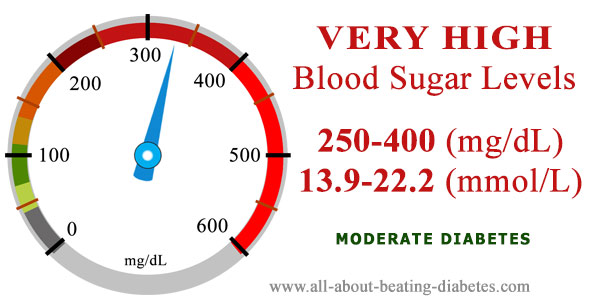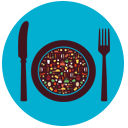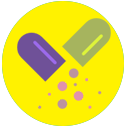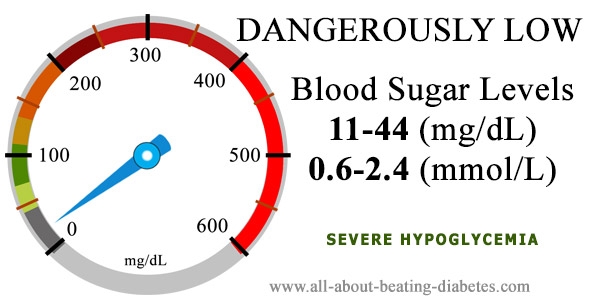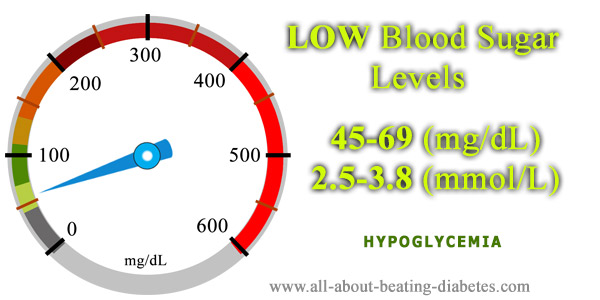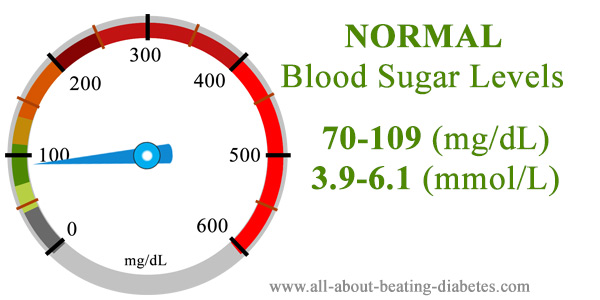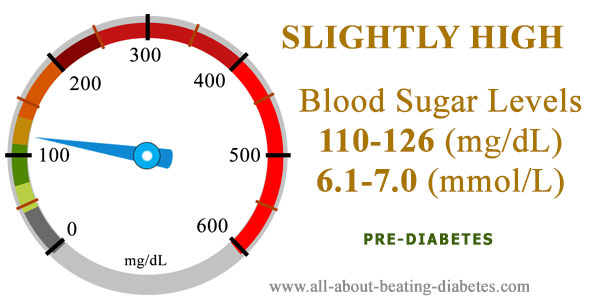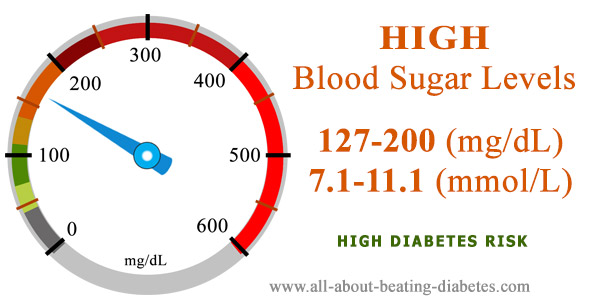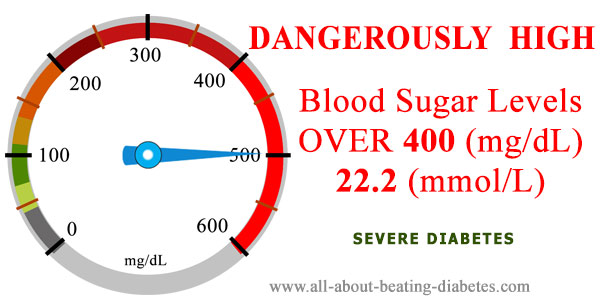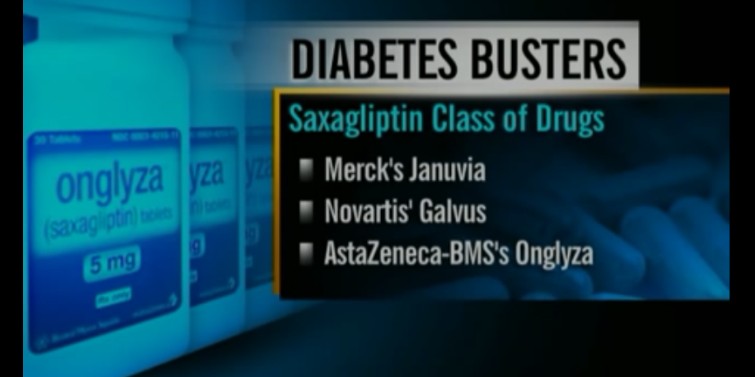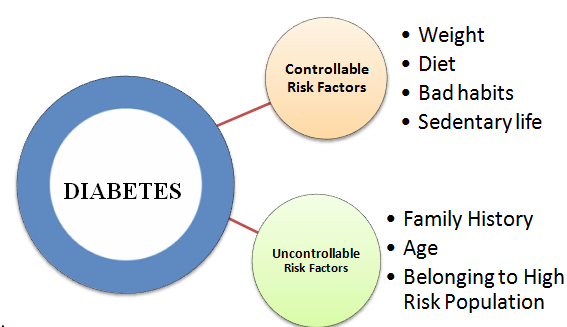- Home
- blood sugar levels
- Sugar Level 250-400 mg/dl
Blood sugar level 250-400 mg/dl (mmol/l)
When your blood sugar was tested...
you found your levels ranging 251, 252, 253, 254, 255, 256, 257, 258, 259, 260, 261, 262, 263, 264, 265, 266, 267, 268, 269, 270, 271, 272, 273, 274, 275, 276, 277, 278, 279, 280, 281, 282, 283, 284, 285, 286, 287, 288, 289, 290, 291, 292, 293, 294, 295, 296, 297, 298, 299, 300, 301, 302, 303, 304, 305, 306, 307, 308, 309, 310, 311, 312, 313, 314, 315, 316, 317, 318, 319, 340, 341, 342, 343, 344, 345, 346, 347, 348, 349, 350, 351, 352, 353, 354, 355, 356, 357, 358, 359, 360, 361, 362, 363, 364, 365, 366, 367, 368, 369, 370, 371, 372, 373, 374, 375, 376, 377, 378, 379, 380, 381, 382, 383, 384, 385, 386, 387, 388, 389, 390, 391, 392, 393, 394, 395, 396, 397, 398, 399.
Having blood sugar level 250-400 mg/dl, regardless if having eaten or not, means you suffer from mild to moderate diabetes.
What does a blood sugar level of 250-400 mg/dL mean?
This range is higher than the normal levels and is a cause for concern, particularly for individuals with diabetes.
Blood sugar levels of 250-400 mg/dL indicate a need for urgent action, adjustments in diabetes management, and seeking guidance from your caring doctor to manage diabetes effectively and maintain overall health.
Here's what these blood sugar levels indicate in terms of diabetes management and overall health:
1. Poor Blood Sugar Control: Blood sugar levels in the range of 250-400 mg/dL indicate poor control of diabetes.
Effective blood sugar management is a fundamental aspect of diabetes care to prevent complications and maintain overall health.
2. Increased Risk of Complications: Consistently high blood sugar levels significantly increase the risk of both short-term and long-term complications associated with diabetes.
3. Impact on Overall Health: Prolonged hyperglycemia can have detrimental effects on overall health, potentially leading to complications like cardiovascular disease, kidney disease, nerve damage, eye problems, and increased susceptibility to infections.
4. Need for Immediate Action: Blood sugar levels in this range require immediate action to lower them and bring them back into a safer range. Without prompt intervention, the risk of acute complications and further health deterioration increases.
5. Diabetes Management Adjustments: Individuals with diabetes will likely need to adjust their diabetes management plan, which may involve changes to their medication regimen, dietary modifications, increased physical activity, and vigilant monitoring of blood sugar levels.
6. Importance of Medical Guidance: Seeking guidance from a healthcare professional, such as a doctor or diabetes educator, is crucial.
They can provide personalized advice and recommend appropriate adjustments to medication, lifestyle, and diet to help lower blood sugar levels and manage diabetes effectively.
7. Long-Term Health Goals: Maintaining blood sugar levels within the target range is a key goal in diabetes management.
Achieving and maintaining better blood sugar control over the long term can help reduce the risk of complications and improve overall health and well-being.
8. Education and Support: Education about diabetes management, including monitoring blood sugar levels, understanding the effects of food and medication, and learning how to respond to high blood sugar episodes, is essential.
Support from healthcare professionals, support groups, or diabetes educators can also be beneficial in managing diabetes effectively.
Is a blood sugar level of 250-400 mg/dL dangerous?
Yes, a blood sugar level of 250-400 mg/dL is considered dangerously high, particularly for individuals with diabetes.
Prolonged exposure to these high levels increases the risk of severe complications, including damage to blood vessels, nerves, kidneys, eyes, and the heart.
The earlier you take immediate action, such as adjusting medications, following a strict diet, staying hydrated, and seeking medical assistance, to bring blood sugar levels within a safe range, the more you can prevent acute and chronic health complications.
Causes of Blood sugar level 250-400 mg/dl
Apart diabetes, and some illness, such levels of glucose may also be due to the intake of specific medicines such as steroids, beta blockers, antipsychotics, pentamidine etc.
You can click in the following sections to find out the detailed information of eating, after eating and
drug-induced levels of glucose 250-400 mg/dl.
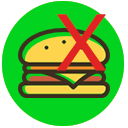 Fasting Fasting |
Can stress or other factors affect blood sugar levels in the 250-400 mg/dL range?
Yes, stress and various other factors can significantly affect blood sugar levels, potentially leading to levels in the range of 250-400 mg/dL.
Here's how:
1. Stress and Hormones: When stressed, the body releases stress hormones like cortisol and adrenaline.
These hormones can cause a spike in blood sugar levels by triggering the liver to release stored glucose into the bloodstream.
2. Emotional Stress: Emotional stress, anxiety, or depression can affect eating habits and physical activity, which in turn can impact blood sugar levels.
Stress may lead to emotional eating, choosing less healthy foods, and neglecting exercise.
3. Lack of Physical Activity: Inadequate physical activity can result in insulin resistance, making it difficult for your body to utilize glucose effectively and leading to elevated blood sugar levels.
4. Poor Diet Choices: Stress can influence food choices, prompting individuals to opt for comfort foods that are often high in sugar, unhealthy fats, and processed carbohydrates, causing blood sugar levels to rise.
5. Inadequate Sleep: Lack of sufficient sleep can cause hormonal imbalances, increase stress levels, and affect insulin sensitivity, all of which can contribute to elevated blood sugar levels.
6. Illness and Infections: Infections, illnesses, or injuries can cause stress responses in the body, leading to elevated blood sugar levels due to increased release of stress hormones.
7. Medications: Some medications, such as certain antidepressants or steroids, can impact blood sugar levels and potentially elevate them.
8. Dehydration: Dehydration can lead to higher blood sugar concentrations as it can cause higher blood glucose levels in the blood.
9. Environmental Factors: Extreme temperatures, whether very hot or very cold, can impact insulin sensitivity and influence blood sugar levels.
Managing stress through relaxation techniques, regular physical activity, adequate sleep, and a balanced diet can help mitigate its impact on blood sugar levels.
What symptoms might I experience with blood sugar levels between 250-400 mg/dL?
With blood sugar levels between 250-400 mg/dL (milligrams per deciliter), individuals may experience a range of symptoms associated with hyperglycemia(high blood sugar).
These symptoms often manifest due to the body's inability to effectively regulate glucose.
It's important to note that individuals may experience varying symptoms based on their overall health, duration of elevated blood sugar levels, and individual response to hyperglycemia.
Common symptoms include: polydipsia (excessive thirst), polyuria (frequent urination), fatigue and weakness, blurred vision, dry mouth and skin, headache, difficulty concentrating, weight loss or gain, slow healing wounds, nausea and/or vomiting, and fruit breath odor.
Blood sugar levels 250-400 mg/dl are usually not an indication for hospitalization, so you most probably should consult with your doctor about the proper anti-diabetic therapy.
What are the potential complications of prolonged blood sugar levels between 250-400 mg/dL?
Consistently elevated blood sugar levels in the range of 250-400 mg/dL (milligrams per deciliter) pose significant risks and can lead to both short-term and long-term complications, especially if left untreated.
Here are potential complications associated with prolonged high blood sugar levels:
1. Diabetic Ketoacidosis (DKA): At blood sugar levels above 250 mg/dL, particularly in uncontrolled diabetes, the body may produce ketones, leading to a serious and life-threatening condition known as DKA.
This condition is characterized by high blood ketone levels, dehydration, electrolyte imbalances, and metabolic acidosis.
2. Hyperosmolar Hyperglycemic State (HHS): Extremely high blood sugar levels, often above 600 mg/dL, can lead to HHS, another life-threatening condition.
HHS is characterized by severe dehydration, altered mental status, and very high blood glucose levels.
3. Cardiovascular Issues: High blood sugar levels can damage blood vessels and the heart over time, increasing the risk of heart disease, heart attack, stroke, and hypertension.
4. Kidney Damage (Diabetic Nephropathy): Prolonged hyperglycemia can damage the kidneys, leading to diabetic nephropathy, a condition that affects kidney function and can progress to kidney failure.
5. Nerve Damage (Diabetic Neuropathy): High blood sugar levels can cause nerve damage, leading to pain, numbness, tingling, or weakness, especially in the extremities.
6. Eye Problems (Diabetic Retinopathy): Elevated blood sugar levels can damage the blood vessels in the eyes, potentially causing vision problems and blindness if left untreated.
7. Peripheral Vascular Disease: Prolonged high blood sugar can impair blood flow to the legs and feet, leading to poor wound healing, infections, and potentially amputation.
8. Impaired Immune Function: Chronic hyperglycemia weakens the immune system, making individuals more susceptible to infections and slower to heal from injuries.
It's crucial to manage blood sugar levels within a target range advised by your healthcare provider to minimize the risk of these complications.
Should I seek immediate medical attention if my blood sugar is in the 250-400 mg/dL range?
Yes, if your blood sugar consistently registers in the 250-400 mg/dL range, seeking immediate medical attention is crucial.
Blood sugar levels within this range indicate a state of hyperglycemia, which can have serious and potentially life-threatening implications.
Given the potential health risks associated with high blood sugar levels, do not hesitate to contact your healthcare provider, visit the nearest emergency room, or call for emergency medical assistance for appropriate evaluation and intervention.
Your health and safety should always be a top priority.
What can I do to lower my blood sugar from 250-400 mg/dL to a healthier range?
It is important to seek personalized advice from healthcare providers to tailor a plan that suits your unique circumstances and health condition.
However, in order to lower your blood sugar from 250-400 mg/dL to a healthier range, take the following steps:
1. Immediate Monitoring and Action: Check your blood sugar levels regularly to track changes and understand how your body responds to different activities and foods.
2. Hydration and Physical Activity: Drink plenty of water to stay hydrated, and engage in regular physical activity like walking or light exercises to help lower blood sugar levels.
3. Healthy Eating: Follow a low-carbohydrate, high-fiber diet with emphasis on vegetables, lean proteins, and healthy fats. Avoid sugary and processed foods.
4. Medication Adherence: Take prescribed medications as directed by your healthcare provider.
If needed, your doctor may adjust dosages or recommend additional medications to help control blood sugar levels.
5. Stress Management and Adequate Sleep: Manage stress through relaxation techniques like deep breathing or mindfulness. Aim for sufficient sleep each night to support overall health.
6. Consult Healthcare Professionals: Work closely with healthcare professionals, including a doctor and a registered dietitian, for personalized guidance and a comprehensive diabetes management plan.
7. Regular Follow-ups: Attend regular check-ups to monitor progress, adjust medications, and make necessary modifications to your diabetes management plan.
Are there specific foods or drinks I should avoid with blood sugar levels in this range?
When dealing with blood sugar levels in the 250-400 mg/dL range, it's crucial to be mindful of the foods and drinks you consume to help manage and lower your blood sugar effectively.
Here are some dietary recommendations to consider:
1. High-Glycemic Carbohydrates: Avoid foods and drinks high in refined sugars and simple carbohydrates, such as sugary beverages, candies, pastries, white bread, and sugary cereals.
These can cause rapid spikes in blood sugar levels.
2. Sweetened Beverages: Steer clear of sugary drinks, fruit juices, and sweetened teas, as they can lead to a quick rise in blood sugar levels.
3. Processed Foods: Minimize or avoid processed foods, which often contain hidden sugars, unhealthy fats, and low nutritional value.
Opt for whole, unprocessed foods instead.
4. Starchy Foods: Limit consumption of starchy foods like white potatoes, white rice, and regular pasta, as they can elevate blood sugar levels.
5. Fruit Juices and Dried Fruits: Be cautious with fruit juices and dried fruits, as they are concentrated sources of sugar and can cause a rapid increase in blood sugar levels.
6. High-Fat Foods: Limit intake of high-fat foods, especially those that are processed or fried, as they can contribute to insulin resistance.
7. Alcohol: Alcohol can cause blood sugar levels to fluctuate unpredictably. If you choose to drink, do so in moderation and monitor your blood sugar closely.
Instead, focus on:
- Non-Starchy Vegetables: Include a variety of non-starchy vegetables like leafy greens, broccoli, cauliflower, peppers, and tomatoes, as they are low in carbohydrates and can help manage blood sugar levels.
- Lean Proteins: Opt for lean protein sources like poultry, fish, tofu, legumes, and eggs to help stabilize blood sugar levels and keep you feeling full.
- Healthy Fats: Incorporate healthy fats from sources like avocados, nuts, seeds, and olive oil to aid in managing blood sugar levels and promote overall well-being.
- Whole Grains: Choose whole grains like quinoa, brown rice, and whole wheat over refined grains to help regulate blood sugar levels more effectively.
It's important to work with a registered dietitian or healthcare professional to create a personalized meal plan that suits your needs and helps manage your blood sugar levels effectively.
Individual dietary recommendations can vary based on your specific health condition and requirements.
What are some lifestyle changes I can make to maintain better blood sugar control and prevent levels in this range?
To maintain better blood sugar control and prevent levels from reaching the high range of 250-400 mg/dL, consider adopting these lifestyle changes:
1. Balanced Diet: Eat a well-balanced diet that includes a variety of fruits, vegetables, whole grains, lean proteins, and healthy fats.
Monitor your carbohydrate intake and choose low-glycemic index foods.
2. Regular Physical Activity: Engage in regular exercise such as brisk walking, jogging, cycling, or dancing.
Aim for at least 150 minutes of moderate-intensity aerobic activity per week, along with strength training exercises.
3. Weight Management: Maintain a healthy weight through a combination of a balanced diet and regular exercise.
Losing excess weight, if needed, can significantly improve blood sugar control.
4. Regular Blood Sugar Monitoring: Monitor your blood sugar levels as advised by your healthcare provider.
Regular monitoring helps you understand how your lifestyle choices affect your blood sugar levels and allows for timely adjustments.
5. Medication Management: Take prescribed medications as directed by your healthcare provider.
Adhere to the prescribed dosages and schedules to maintain consistent blood sugar levels.
6. Stress Management: Practice stress-reducing techniques like deep breathing, meditation, yoga, or spending time in nature.
Stress can affect blood sugar levels, so managing it is crucial.
7. Adequate Sleep: Aim for 7-9 hours of quality sleep each night.
Sufficient sleep supports hormone regulation and overall well-being, which are important for blood sugar control.
8. Hydration: Stay well-hydrated by drinking plenty of water throughout the day.
Avoid sugary beverages and excessive consumption of caffeinated drinks.
9. Education and Self-Care: Learn about diabetes, its management, and how lifestyle choices impact blood sugar.
Take an active role in managing your condition and practice self-care.
10. Meal Planning and Portion Control: Plan your meals ahead of time, focusing on portion control and balanced nutrition.
Avoid skipping meals and follow a regular eating schedule.
11. Limit Sugary and Processed Foods: Minimize your intake of sugary foods, processed snacks, and sugary drinks as they can cause rapid spikes in blood sugar levels.
12. Collaborate with Healthcare Professionals: Work closely with your healthcare team, including your doctor, dietitian, and diabetes educator, to develop a personalized diabetes management plan.
13. Regular Check-ups: Attend regular check-ups with your healthcare provider to monitor your diabetes management progress, discuss any challenges, and make necessary adjustments to your treatment plan.
By incorporating these lifestyle changes into your routine, you can effectively manage your blood sugar levels and reduce the risk of dangerously high readings.
Should I adjust my diabetes medication if my blood sugar consistently falls in the 250-400 mg/dL range?
Yes, if your blood sugar consistently falls in the 250-400 mg/dL range, it's essential to consult with your healthcare provider to discuss potential adjustments to your diabetes medication.
Consistent high blood sugar levels can indicate that your current medication regimen may not be effectively managing your blood sugar.
Modifying your medication in a safe and controlled manner, under your healthcare provider's guidance, can help bring your blood sugar levels within a healthier range.
Your healthcare provider may suggest various adjustments, such as altering dosages, changing the type of medication, or adding new medications to your treatment plan.
They will evaluate your overall health, medical history, lifestyle, and any recent changes that might be influencing your blood sugar levels.
Self-adjusting medication without professional guidance can be risky and may lead to inadequate blood sugar control or even dangerous lows (hypoglycemia).
Regular communication with your healthcare team is crucial, allowing for a comprehensive evaluation of your diabetes management plan and making appropriate adjustments based on your individual needs.
My patient's case: Random blood sugar 400 and as low as 157
Hi,
Three weeks before, my husband random blood sugar level is 400 but now 157. Is this good or bad?
Aimee, Maldives
Answer: Hello Aimee,
Random glucose testing is important to distinguish how effective the treatment is. In diabetic people, the numbers for random glucose levels may vary widely.
The comparison between days is not the right one. Take the random glucose test multiple times during a day and compare the numbers.
In a diabetic person, they may vary more than in normal people but they must not vary too widely. If they do vary a lot this means that the treatment is not effective or your husband is not following it.
The glucose levels must stay relatively stable as much as possible. Also, stress, diet and the time of the time may influence the results.
It is important to control diabetes in order to prevent serious complications in the future and current symptoms.
Hope this is helpful for your husband.
Blood sugar levels 250-400 mg/dl induced by drugs - symptoms-treatment
In some cases, the blood sugar levels can reach as high as 250-400 mg/dl induced by certain drugs such as Thiazines, beta blockers, statins, steroids, antipsychotics, immunosuppressive agents, pentamidine, nicotinic acid etc.
The increased levels of glucose may be because of the increase of insulin resistance, or due to the affection of insulin secretion, or both.
The symptoms are the same as for diabetes but with the difference of the time when they might appear. So, you might notice them shortly after taking the drug, or even after taking it for a long time.
Sometimes it takes a few days after the initial start of the drugs for the symptoms to appear.
The very first thing to do when you catch your blood sugar levels high and are taking that particular medication, is to stop using the drugs.
If after being off the drug, the increased glucose numbers persist, then a further consultation with your doctor for further confirmatory tests. Perhaps, you may need to start an anti-diabetic treatment for a short period only until improvement of glucose levels.
Patient's Case: Hi, My mother is 88 yrs old. She has been taking Glyree M1 after breakfast only. Her Fasting sugar was 112 and PP/ after 2 hrs after b'fast was 284 and 264 consequently for two days Is there any cause for concern or change of medication required. Vijay
Answer: Hi, Your mother's blood sugar levels after eating breakfast is considered really high for her age. need to change medication. Please provide the names of meds she is currently taking.
Thank you.
Patient's case: Hello doctor my blood sugar level is 250 mg what to do? (by Riya Lotlikar - GOA)
Answer: Hi, If your blood sugar is 250 mg when measured randomly is a bit high. However, it depends on what you have eaten? the time of measurement?
Take another test fasting and run HbA1C test to determine the average of blood glucose the last three months.
For the moment, try to make some changes in your diet and lifestyle regimen. Start taking some natural remedies for diabetes.
Thank you.
Take-Home Tips
- Blood sugar levels of 250 to 400 are considered very high and dangerous.
- Causes include: uncontrolled diabetes; taking some medications like steroids, antipsychotics, betablockers, etc.
- Symptoms are similar to diabetes: increased thirst and urination, etc.
- Treatment is by treating the underlying condition.
|
Written by Dr.Albana Greca Sejdini, Md, MMedSc Medically reviewed by Dr.Ruden Cakoni, MD, Endocrinologist |
Last review 10/06/2023 |
References:
- High sugar during exercise
- Dangerous diabetes blood sugar levels
- Challenges and perspectives in continuous glucose monitoring.
- Professional flash continuous glucose monitoring as a supplement to A1C in primary care.
Diabetes complications Questions or Problems? Get Help Here
This is the place where you can ask a question about any aspect of diabetes complications.
It's free and it's easy to do. Just fill in the form below, then click on "Submit Your Question".
|
blood sugar level 11-44 After eating blood sugar level 11-44 Fasting blood sugar level 11-44 After medication |
Blood glucose level 45-69 Blood glucose level 45-69 Blood glucose level 45-69 |
Blood glucose level 70 -109 Blood glucose level 70 -109 Blood glucose level 70 -109 |
|
Blood glucose level 110-126 Blood glucose level 110-126 Blood glucose level 110-126 Blood glucose level 250-400 Blood glucose level 250-400 Blood glucose level 250-400 |
Blood glucose level 127-200 Blood glucose level 127-200 Blood glucose level 127-200 Blood glucose level over400 Blood glucose level over400 Blood glucose level over400 |
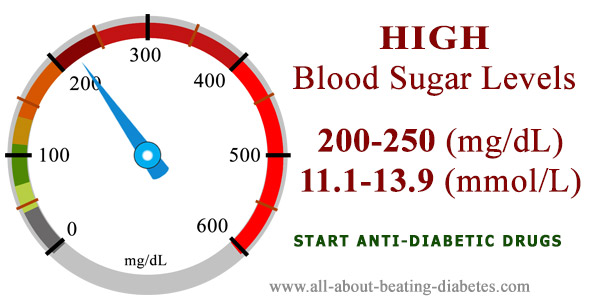 Blood glucose level 200-250 Blood glucose level 200-250Blood glucose level 200-250 Blood glucose level 200-250 Blood glucose level 200-250 |
